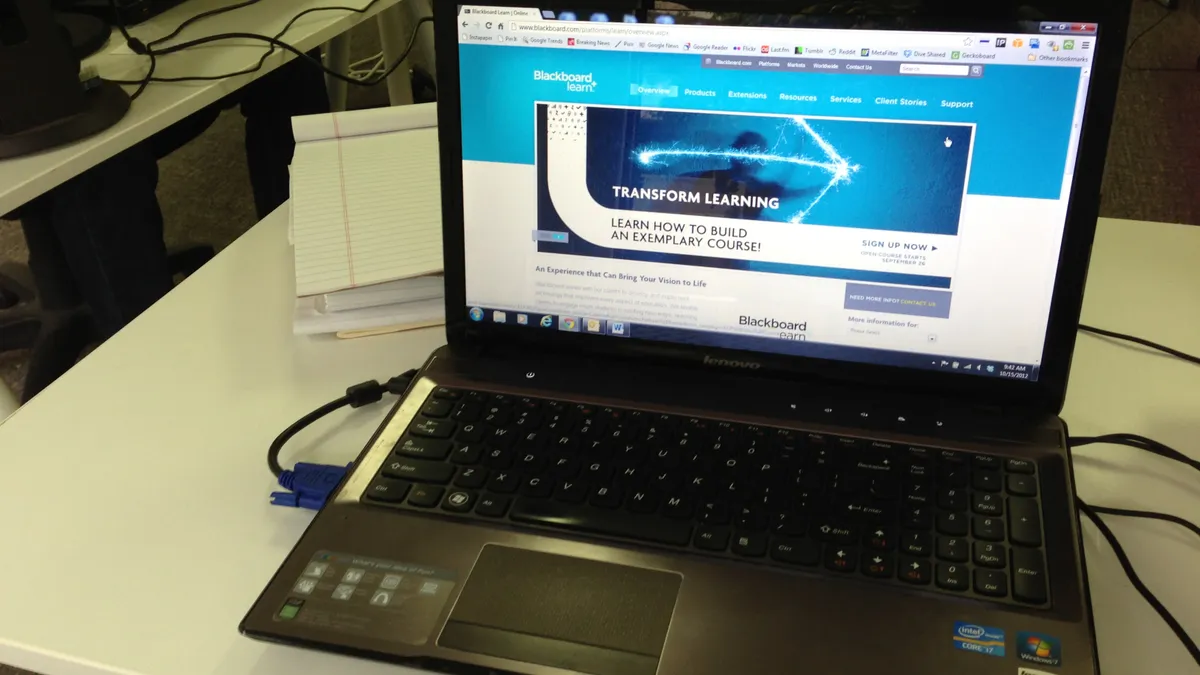Learning management systems (LMSs) have become an indispensable part of higher education, as well as many K-12 and business environments. The $1.9 billion LMS market is diverse, too, encompassing in-house systems, open source options and out-of-the-box setups.
Online programs from providers such as the University of Phoenix, Coursera and edX have stirred up change in higher ed in recent years, but even as they continue to shake things up, leading LMS providers such as Blackboard, Moodle and Desire2Learn have established broader groups of clientele and adapted.
Here's a look at 12 of the biggest names among LMS providers, as well as how they have distinguished themselves and what they provide:
1. BLACKBOARD
Blackboard is an ever-growing force to be reckoned with in the LMS market, having acquired the likes of WebCT and Prometheus over the years. Though it doesn’t command the 76% market share it had in 2006, the company still held around 51% of the market share as of 2011. With Blackboard Mobile, the company has expanded its LMS offerings into the digital realm, and Blackboard also launched its Open Source Services Group in 2012, committing to support open source systems. The additional acquisition of Moodle partners Moodlerooms and NetSpot can only help to bolster that commitment going forward.
2. MOODLE
Just behind Blackboard with 19% of the market share in 2011 is open source LMS provider Moodle. The company, which provides its software free through a GNU General Public License, continues to add partners around the globe and hosted its first Moodle Research Conference in Crete, Greece last September. A second research conference is being organized for later this year, and Moodle issued a call for proposals in January.
3. DESIRE2LEARN
Desire2Learn remains a key player in the LMS market out of Canada. The company—which trails Blackboard and Moodle with 11% of the market share—has several new products, including the Binder mobile app and the campus-specific Campus Life app. All of those and more comprise a swelling ecosystem of offerings that the company continues to nurture.
4. SAKAI
Along with being supported by Blackboard, Sakai boasts more than 350 educational organizations among its clientele. The Sakai Foundation was founded in 2006 and includes more than 80 members, all higher education institutions and commercial entities, across five continents. Recently, Sakai and Jasig merged to form another nonprofit, Apereo, which will also continue to develop open source educational software. As of 2011, Sakai held 7% of the market share.
5. JENZABAR
Jenzabar’s LMS is promoted as the only system that fully integrates with your institution’s administrative system, allowing seamless data exchange. Available through any mobile device, it offers integration options such as ConnectEDU’s CoursEval web-based course evaluation software, Intellidemia’s Concourse online syllabus management software, and Learning Objects’ e-Portfolio and CampusPack social learning software. The company announced its new Jenzabar Social tool, which allows universities to easily integrate Facebook with their LMS and enterprise resource planning solution, at Educause 2012.
6. PEARSON LEARNINGSTUDIO/ECOLLEGE
Since its acquisition by publishing giant Pearson in 2007, eCollege has worked to power Pearson’s LearningStudio LMS with its SaaS learning platform. Setting LearningStudio apart from the previous LMSs on this list is that it was built to support fully online programs. In 2012, Pearson eCollege teamed with Watchitoo to bring real-time HD video chat to online courses through LearningStudio. Seamless Blackboard integration is also available via Blackboard Collaborate.
7. CANVAS BY INSTRUCTURE
Instructure’s Canvas is an open source LMS that offers numerous features including analytics, hands-free updates, speed grading, and a 99.9% guaranteed uptime Service Level Agreement. According to Instructure’s philosophy, Canvas was built, and continues to be updated, according to feedback and suggestions. The company recently announced that it tripled its customer base in 2012. Additionally, the latest addition to its features allow teachers to provide students with audio and video feedback.
8. ANGEL LEARNING
ANGEL Learning merged with Blackboard in 2009, leading to the creation of Blackboard Learn ANGEL Edition. Now on version 8.0, the LMS features Chrome and Safari certification, seamless content conversion, and improvements to navigation. Blackboard also offers an upgrade cohort program to institutions wishing to transition from ANGEL to Blackboard Learn 9.1.
9. CENGAGE LEARNING/MINDTAP
Cengage Learning promotes its MindTap as a “highly personalized, complete online learning solution” that is “more than an eBook and different from a learning management system.” Using MindTap, instructors are able to personalize the learning experience by adding their own content in the system’s “Learning Path” through apps that integrate with learning management systems. Though not a LMS itself, it’s certainly a product that can enrich the LMS experience.
10. LOUDCLOUD
Founded in 2010, LoudCloud promises an adaptive and highly personalized experience for students and teachers with its LMS. The LoudCloud Learning Ecosystems feature various cloud-based deployment options, “pick and choose” access to tools, predictive analytics and web 2.0 social collaboration. Despite being relatively young, LoudCloud continues to pick up new clients in higher education and K-12, with its most recent additions being Lutheran High School in Parker, Colo., Bryan University in Tempe, Ariz., and YTI Institute in York, Penn. It was also named as a strategic partner of the Shared Learning Collaborative in September.
11. ADRENNA
Adrenna is a new player in the open source LMS market. Using what it calls “Chameleon Technology,” the Adrenna Academic LMS can mimic an existing LMS or be customized to your organization. Aside from the standard LMS features, the platform also offers integration with a variety of social media.
12. MCGRAW-HILL CONNECT
Academic publisher McGraw-Hill’s Connect provides rich content, a variety of assignment types and flexible options in its digital learning environment. Capable of providing a number of reports targeted at individual students, classes, or sections—and tailored for various roles like professor, department chair or Dean—Connect promises to make it easier to measure and improve student achievement. The platform also offers simple integration with Blackboard 8.0, 9.0 and 9.1. A mobile version is now in Open Beta and vibrant infographics were made available in August via McGraw-Hill LearnSmart.
Would you like to see more education news like this in your inbox on a daily basis? Subscribe to our Education Dive email newsletter! You may also want to read Education Dive's look at the top 10 online bachelor's degree programs.














